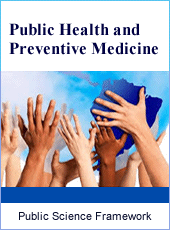Public Health and Preventive Medicine
Articles Information
Public Health and Preventive Medicine, Vol.2, No.1, Feb. 2016, Pub. Date: Apr. 14, 2016
Anxiety, Depression and Other Psychological Effects on Women After Induced Abortion
Pages: 1-5 Views: 4051 Downloads: 1201
[01]
Bujar Obertinca, Instiutute of Forensic Psychiatry of Kosova, University Clinical Center of Kosova, Pristina, Kosovo.
[02]
Myrvete Pacarada, Clinic of Gynaecology and Obstetric, University Clinical Centre of Kosova, Pristina, Kosovo.
[03]
Albiona Beselica Beha, Clinic of Gynaecology and Obstetric, University Clinical Centre of Kosova, Pristina, Kosovo.
[04]
Florim Gallopeni, Qeap-Himerer, Pristina, Kosovo.
[05]
Niltene Kongjeli, Clinic of Gynaecology and Obstetric, University Clinical Centre of Kosova, Pristina, Kosovo.
[06]
Astrit Gashi, Clinic of Gynaecology and Obstetric, University Clinical Centre of Kosova, Pristina, Kosovo.
[07]
Valbona Blakaj, Instiutute of Forensic Psychiatry of Kosova, University Clinical Center of Kosova, Pristina, Kosovo.
Emotional and psychological effects after abortion are common, they are experienced in varying degrees in every woman. Most common emotional and psychological effects after abortion are: repentance, anger, guilt and shame, loss of self confidence, feelings of loneliness, eating disorders, sleeping disorders, anxiety and depression. This study is transversal (cross - sectional study), based on two questionnaires, Beck anxiety questionnaire and Edinburgh Postnatal Depression Scale questionnaires (EDPS). It was attended by 122 women after induced abortion from January to December of 2015 in Gynecology and Obstetrics Clinic in Prishtina. Abortions were induced for fetal anomalies, maternal various diseases and as unwanted pregnancies. Incidence of induced abortions in Prishtina in 2015 was 12:47 per 1000 pregnant. ; Abortions where induced until the 10th week of pregnancy, by the decision of the couple 38.5%, anomalies of the central nervous system 23.9% genetic syndromes 6.5%, multiplex fetal anomaly 6.5%, abnormality of the urinary tract was 4.9% the anomaly of the gastrointestinal system 4.9% (n = 6), other feto-maternal pathology 4.9%, maternal chronic disease 3.4%, the cardiovascular system anomalies 2.4%, musculoskeletal system anomalies 2.4%, placental pathology 1.7%. Most frequently psychological effects were: sleep disorders 22.13% (n=27), repentance 25.40%,anger 36.06%, feelings of guilt and shame, 27.4%, the loss of faith itself 34.42%, feelings of loneliness 29.5%, food disorders 29.5%, anxiety 30.32%, depression 27.86%. These emotional effects can have a negative effect on planning pregnancy and holding other pregnancies.
Induced Abortion, Psychological Effects, Kosovo
[01]
Speckhard A. Psycho-social stress following abortion. Kansas City (Mo): Sheed and Ward; 1987.
[02]
Speckhard A, Rue V. Postabortion syndrome: an emerging publichealth concern. J Soc Issues 1992;48: 95–120.
[03]
Major B, Appelbaum M, Beckman L, et al. Abortion and mental health: evaluating the evidence. Am Psychol 2009;64: 863-90.
[04]
Robinson GE, Stotland NL, Russo NF, et al. Is there an “Abortion Trauma Syndrome”? Critiquing the evidence. Harv Rev Psychiatry 2009;17: 268-90.
[05]
Cameron S. Induced abortion and psychological sequelae. Bailliere’s best practice & research. Clin Obstet Gynaecol 2010; 24: 657-65.
[06]
Major B et al., Abortion and mental health: evaluating the evidence, American Psychologist, 2009, 64(9): 863–890.
[07]
Connolly T and Zeelenberg M, Regret in decision making, Current Directions in Psychological Science, 2002, 11(2): 212–216.
[08]
Psychological responses of women after first- trimester abortion, Archives of General Psychiatry, 2000, 57(8): 777–784.
[09]
Charles VE et al., Abortion and long-term mental health outcomes: a systematic review of the evidence, Contraception, 2008,78(6): 436–450.
[10]
Cox J, Holden J, Sagowsky R. Detection of the post natal depression: development of the 10-item Edinburgh Post Natal Depression Scale. Br J Psychiatry 1987; 150: 782-6.
[11]
Peen J, Schoevers RA, Beekman AT, Dekker J (2010) The current status of urban-rural differences in psychiatric disorders. Acta Psychiatr Scand 121: 84–93.
[12]
Stewart RC, Umar E, Tomenson B, Creed F (2014) A cross-sectional study of antenatal depression and associated factors in Malawi. Arch Womens Ment Health 17: 145–154.
[13]
Fall A, Goulet L, Vézina M (2013) Comparative study of major depressive symptoms among pregnant women by employment status. Springerplus 2: 201.
[14]
Soomro RH, Riaz F, Naved S, Soomro FH (2012) Comparative Analysis of Depression among Housewives and Working Women in Bilal Colony of Kornagi Area Karachi.
[15]
Melchior M, Caspi A, Milne BJ, Danese A, Poulton R, et al. (2007) Work stress precipitates depression and anxiety in young, working women and men. Psychol Med 37: 1119–1129.
[16]
Westdahl C, Milan S, Magriples U, Kershaw TS, Rising SS, et al. (2008) Social Support and Social Conflict as Predictors of Prenatal Depression. Obs Gynecol 110: 134–140.
[17]
Blackmore ER, Côté-Arsenault D, Tang W, Glover V, Evans J, et al. (2011) Previous prenatal loss as a predictor of perinatal depression and anxiety. Br J Psychiatry 198: 373–378.
[18]
Broen AN, Moum T, Bödtker AS, Ekeberq O. (2005) Reasons for induced abortion and their relation to women’s emotional distress: a prospective, two-year follow-up study. Gen Hosp Psychiatry 27: 36-43.
[19]
Broen AN, Moum T, Bödtker AS, Ekeberq O. (2005) The course of mental health after miscarriage and induced abortion: a longitudinal, fiveyear follow-up study. BMC Med 3: 8.

ISSN Print: 2381-778X
ISSN Online: 2381-7798
Current Issue:
Vol. 7, Issue 3, September Submit a Manuscript Join Editorial Board Join Reviewer Team
ISSN Online: 2381-7798
Current Issue:
Vol. 7, Issue 3, September Submit a Manuscript Join Editorial Board Join Reviewer Team
| About This Journal |
| All Issues |
| Open Access |
| Indexing |
| Payment Information |
| Author Guidelines |
| Review Process |
| Publication Ethics |
| Editorial Board |
| Peer Reviewers |


